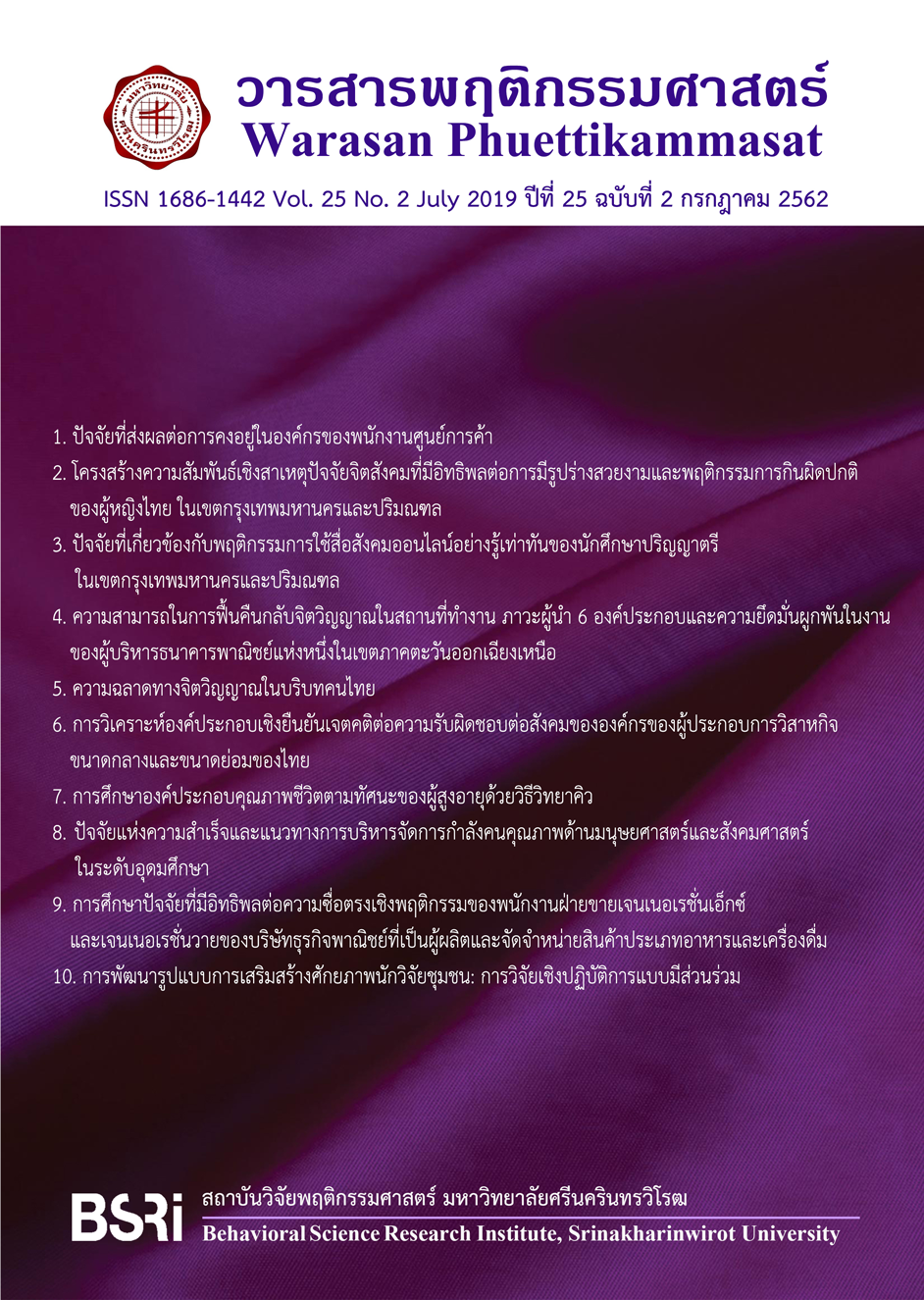การวิเคราะห์องค์ประกอบเชิงยืนยันเจตคติต่อความรับผิดชอบต่อสังคมขององค์กรของผู้ประกอบการวิสาหกิจขนาดกลางและขนาดย่อมของไทย
Keywords:
corporate social responsibility, attitude, confirmatory factor analysisAbstract
การวิจัยครั้งนี้มีวัตถุประสงค์ เพื่อวิเคราะห์องค์ประกอบเชิงยืนยันและตรวจสอบความตรงเชิงโครงสร้าง
ของความเชื่อภายใต้เจตคติต่อความรับผิดชอบต่อสังคมขององค์กร (CSR) ของผู้ประการขนาดกลางและขนาดย่อม (SMEs) ของไทย โดยมีกลุ่มตัวอย่าง คือผู้ประกอบการ SMEs ในสาขาอุตสาหกรรมที่สำคัญที่สุด 6 อันดับแรกเรียงตามสัดส่วนรายได้ประชาชาติ จำนวน 510 คน เครื่องมือที่ใช้ในการวิจัยคือแบบสอบถามด้านความเชื่อภายใต้
เจตคติต่อความรับผิดชอบต่อสังคมขององค์กรที่สร้างขึ้นมาจากการทบทวนวรรณกรรม และทำการยืนยันโดย
การสัมภาษณ์เชิงลึก ข้อมูลที่ได้มีการนำมาศึกษาโดยการวิเคราะห์องค์ประกอบเชิงยืนยัน (Confirmatory Factor Analysis) ผลการวิจัยครั้งนี้พบว่าองค์ประกอบความเชื่อภายใต้เจตคติต่อ CSR ของผู้กอบการ SMEs ไทย ประกอบด้วย 8 ตัวชี้วัดหรือแปรย่อย ได้แก่ ภาพลักษณ์บริษัท ความแตกต่างสินค้า ประโยชน์ด้านแรงงาน
ความเชื่อด้านประสิทธิภาพ ประโยชน์สังคมด้านเศรษฐกิจ ข้อบังคับและการต่อต้านชุมชนสังคม การทำหน้าที่พลเมือง โดยค่าน้ำหนักของมีค่าอยู่ระหว่าง 0.58 – 0.88 ตัวแบบองค์ประกอบมีความสอดคล้องกับข้อมูล
เชิงประจักษ์ พิจารณาจาก ค่าไค-สแควร์ = 17.82, df = 14, GFI=0.99, CFI = 1.00, GFI = 0.99,TLI = 1.00, RMSEA = 0.023 และ SRMR = 0.014
Downloads
References
Ajzen, I. (2011). behavioral interventions: design and evaluation guided by the theory of planned behavior. In the Social psychology for program and policy evaluation (pp. 74–100). New York: Guilford.
Campbell, J. L. (2007). Why would corporations behave in socially responsible ways? an institutional theory of corporate social responsibility. Academy of Management Review, 32(3), 946–967.
Carroll, A. B. (1979). A Three-dimensional conceptual model of corporate performance. The Academy of Management Review. 4(4): 497–505.
Commission of the European Communities. (2001). Promoting a European framework for corporate social responsibility. Green Paper, Commission of the European Communities, Brussels.
Costello, A. & Osborne, J. 2005. Best practices in exploratory factor analysis: four recommendations for getting the most from your analysis. Practical Assessment Research & Evaluation, 10 (7): 1-9.
Davis, K. (1973). The case for and against business assumption of social responsibilities. Academy of Management Journal, 16(2), 312-322.
Donaldson, T. (1982). Constructing a social contract for business. in corporations and morality. pp. 36-58. New Jersey: Prentice-Hall.
Egels-Zandén, Niklas.; & Kallifatides, Markus. (2009). The UN Global Compact and the enlightenment tradition: a rural electrification project under the aegis of the UN Global Compact. Corporate Social Responsibility and Environmental Management. 16(5): 264–277.
Graafland, J., & Schouten, C. M.-V. (2012). Motives for corporate social responsibility. De Economist, 160(4), 377-396.
Frederick, William C. (1994, August). From CSR1 to CSR2: the maturing of business-anti-society thought. Business & Society. 33(2): 150–164.
Friedman, Milton. (1970, September 13). The social responsibility of business is to increase its profits. The New York Times. pp. 32–33.
Garriga, E., & Melé, D. (2004). Corporate social responsibility theories: mapping the territory. Journal of Business Ethics, 53(1/2), 51-71.
Hair, J. F., Black, W. C., Babin, B. J., & Anderson, R. E. (2010). Multivariate data analysis: A global perspective. (7th ed.). Upper Saddle River, NJ: Prentice-Hall.
Hay, Robert.; & Gray, Ed. (1974). Social responsibilities of business managers. Academy of Management Journal. 17(1): 135–143.
Kiatfaungfu S. (n.d.). Rœ̄m dūai čhai tham dūai mư̄ krom rōngngān ʻutsāhakam kap khrōngkān khwāmrapphitchō̜p tō̜ sangkhom [Start with heart, made by hand, Department of Industrial Work and social responsibility,] Retrieved from https://www.diw.go.th/km/other/ pdf/CSR.DIW.pdf
McWilliams, A.; & Siegel, D. (2001). Corporate social responsibility: a theory of the firm perspective. The Academy of Management Review. 26(1): 117–127.
Nunnally, J. C., & Bernstein, I. H. (1994). Psychometric theory. (3rd ed.). New York: McGraw-Hill.
Porter, M. E., & Kramer, M. R. (2006). Strategy and society: the link between competitive advantage and corporate social responsibility. Harvard Business Review, 84(12), 78-92.
Office of Small and Medium Enterprises Promotion. (2011). Phǣnkān songsœ̄m wisāhakit khanāt klāng læ khanāt yō̜m chabap thī sām ( Phō̜.Sō̜. 2555 - 2559) [The third small and medium entreprise promotion plan (Year 2012-2016)]. Bangkok: Office of Small and Medium Enterprises Promotion.
Votaw, Dow. (1972, Winter). Genius becomes rare: a confinement on the doctrine of social responsibility Pt . I. California Management Review. 15(2): 25–32.
Downloads
Published
How to Cite
Issue
Section
License
Behavioral Science Research Institute, SWU
114 Sukhumvit 23, Bangkok 10110, Thailand.
Tel.02-649-5000 # 17600



